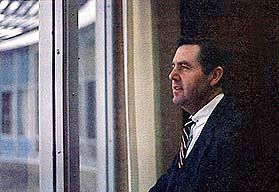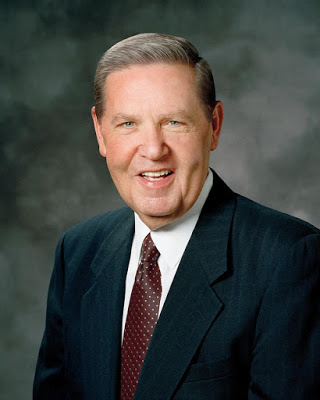5 Words That Changed Elder Holland’s Graduate School Experience
Elder Jeffrey R. Holland is a beloved speaker and leader in The Church of Jesus Christ of Latter-day Saints. He is a master teacher, with a gift for sharing experiences from his life in a powerful way that imparts memorable lessons. Many of us can recall, for example, his story of pulling a small U-Haul trailer behind his family’s old car, only to have the car break down–twice–after driving just 34 miles of his family’s 2,600 mile journey to graduate school.
One of my favorite experiences of Elder Holland’s occurred early in his married life–before that fateful drive from St. George to New Haven–when he was serving as a bishop in Seattle, Washington. Anyone who has ever been to college or graduate school can almost certainly relate to his experience, but the lesson he learned is one that anyone can apply in almost any meaningful context. A decision that seemed relatively small and inconsequential turned out to have an unexpectedly significant impact on his future. I have tried to always remember Elder Holland’s invitation, at the end of this story, to “knock one more door.”
Here is the experience, in Elder Holland’s own words:
One summer in Seattle, I was taking a class that was particularly demanding. I wasn’t exactly ecstatic over the teacher, and the material he used in the course seemed uneven and often unwisely chosen. But I jumped in and tried to ride the waves as best I could.
Just as a major midterm paper was coming due, my parents called and said they were coming to visit us. That was, of course, wonderful news. We needed a shot in the arm from our parents just as you do from yours. They had never been to the Northwest, and we wanted to show them everything. However, time was going to be a bit of a problem. I was teaching a full summer schedule and taking this class on the side. And like the iceberg and the Titanic in Thomas Hardy’s poem, my parents and this paper converged upon me at exactly the same moment. Now there’s no sense even discussing which option was most attractive to me. We had not seen my parents in more than eighteen months, and I’ve already told you how I felt about the class. Furthermore, the class was an optional thing I was doing. After all, this wasn’t the university at which I would be doing my graduate work, and certainly no one but I cared whether I did well in the class or not.
Well, as fate would have it, my parents arrived on a Friday, and my paper was due the next Monday. I had had the good sense to go to work on it reasonably early, so it wasn’t as though I had to do it all over one weekend. (I had tried that at BYU and found that it didn’t work very well.) So I had the paper virtually complete, except for one thing. I didn’t like it. It wasn’t right. I had to work more on it.
We set everything aside that Friday night and had a great time. My wife made tacos and enchiladas, the art for which my father said he would have banned me from the house had I not married her. We laughed and talked and had great fun. And then I had a decision to make. It was a kind of a missionary decision, if you will.

Saturday was a natural day to get up early, drive a couple of hours into British Columbia, meander back down the coast along the Puget Sound, and end up at the Seattle Center to enjoy all the remnants of the World’s Fair. That would leave Sunday for my duties as a bishop and then most of Monday to visit some other spots before they left Tuesday to see my brother in California. That just posed one problem. My paper.
Now I ask you to remember that this was not life-and-death, or at least it did not seem so to me. For all intents and purposes, I could have caved in on the course, and no one would have cared. But that somehow did not seem right to me. I was plagued, if you will, with “missionary feelings.” So I made a deal with my parents. If they would do all that I had outlined for Saturday with my wife, Pat, and our son, Matt, who was then two, but minus me, I would have my paper completely finished for the rest of their stay plus the promise of barbecued steak, tossed green salad, garlic bread and baked potatoes by the time they got back. With one proviso, of course—that my Dad leave me enough money to buy the steak.
Well, they were disappointed, and so was I, but it seemed the best thing to do. So they played and I worked. I wrote and rewrote and shouted and tore up papers and punched the typewriter and rewrote. It didn’t go as smoothly as I had hoped, but it went. I finally got it into what seemed reasonably acceptable shape and then threw myself (figuratively, of course) into the tossed green salad. Dad had left a dollar or two, Pat had found some steaks at the store, and I had started the coals on the grill, using part of the fury I was feeling over a paragraph that wouldn’t work. But the paper was finished and the food was on the table when they returned.
Now that isn’t much of a story except that it has made a great deal of difference in my life. When I got that paper back from a teacher I didn’t like much in a course I didn’t particularly enjoy, the professor had written just five words. I think it was all he had said to me during the entire term: “Publishable paper. See me sometime.”

Well, the aftermath doesn’t really matter either except to say that this professor turned out to be, by sheer coincidence I suppose, a very close friend of a faculty member in my intended department at Yale. And then one thing led to another, and he wrote a note, saying, in effect, “You may want to consider this chap even if you haven’t heard of St. George, Utah.” There were other contacts along the way and other blessings that came, but my point is, again, sort of a missionary point. With that paper that summer in a remote setting—remote at least in terms of my ultimate plans—it made all the difference in the world for me to tract just one more door before calling it a day. To have done otherwise certainly would have been understandable and certainly would have been more enjoyable. But it has made a wonderful difference in my life to have demanded just a bit more of myself on that occasion.
Forgive me if I see this experience as being in the same category as modest dress and attractive grooming and honesty on an exam, but I do. It is something better than average effort, it is something a little harder than par, it is something more rewarding in the long run. I ask you—for your sake and for the untold future you now only dream of—to work hard, work early, be honest, knock on one more door before quitting, stand out in the crowd through extra effort and personal commitment. (Elder Jeffrey R. Holland, “Are You True?” BYU Devotional, September 2, 1980)

Elder Jeffrey R. Holland was ordained a member of the Quorum of the Twelve Apostles of The Church of Jesus Christ of Latter-day Saints on June 23, 1994. At the time of this call, Elder Holland was serving as a member of the First Quorum of the Seventy, to which he had been called on April 1, 1989. From 1980 until his call as a General Authority in 1989, Jeffrey R. Holland served as the ninth president of Brigham Young University in Provo, Utah. He is a former Church commissioner of education and dean of the College of Religious Education at BYU. A student leader and varsity athlete at Dixie High School and Dixie College in his native St. George, Utah, he received his bachelor’s and master’s degrees in English and religious education, respectively, from Brigham Young University. He obtained master’s and doctor of philosophy degrees in American Studies from Yale University. For his work in improving understanding between Christians and Jews, he was awarded the “Torch of Liberty” award by the Anti-Defamation League of B’Nai B’rith. He has served on the governing boards of a number of civic and business related corporations and has received the “Distinguished Eagle Scout” award from the Boy Scouts of America. He is the author of eight books, one of which he co-authored with his wife, Patricia. Elder Holland was born December 3, 1940, to Frank D. and Alice Bentley Holland. In 1963, he married Patricia Terry. They are the parents of three children, Matthew S. Holland, Mary H. McCann and David F. Holland.



